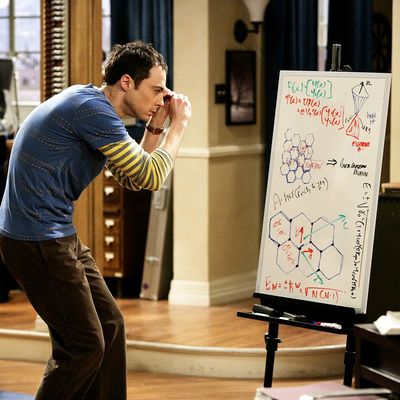
For 12 seasons, The Big Bang Theory has been allowing us to hang out with a group of geniuses. And while they’ve displayed more than their share of nerdery and goofiness, the TBBT gang has also exposed viewers to plenty of real-world science and of-the-moment scientific discoveries. Thanks to Sheldon’s romantic advice for Penny, for example, who among TBBT viewers hasn’t felt super smart showing off their understanding of the Schrödinger’s-cat thought experiment? Who didn’t consider starting their own business after the guys helped Penny sell thousands of dollars of glittery hair barrettes with their science, marketing, and manufacturing insights? And who hasn’t become so invested in Sheldon and Amy’s quest to win a Nobel Prize that they’ve made the effort to try to understand what “superasymmetry” actually is?
This is one of the Emmy-winning comedy’s most under-appreciated legacies, and in honor of the show’s impact, we’re fondly remembering 18 of the smartest, science-friendly Big Bang Theory episodes.
“The Luminous Fish Effect,” Season 1
Airdate: Oct. 15, 2007
TV Science: Sheldon loses his job after he calls his Caltech boss an idiot, and he uses his new abundance of free time on various experiments: loom weaving, trying to perfect scrambled eggs, and his billion-dollar idea — glow-in-the-dark fish. If he slips the DNA from luminous jellyfish into mini fishbowl inhabitants, Sheldon reasons, he could invent “fish nightlights.” It turns out to be a success, too: As he goes to sleep that night, his room is illuminated by a glowing little swimmer in a bedside-table bowl.
Real Science: Glowing fish aren’t just for entrepreneurial TV scientists. In 2003, GloFish became a real product sold in the United States, available in colors like Electric Green and Galactic Purple, and in varieties like danios, tetras, and sharks.
“The Middle-Earth Paradigm,” Season 1
Airdate: Oct. 29, 2007
TV Science: When the fellas are invited to Penny’s Halloween costume party, Sheldon hopes to win a prize — say, most-accurate visualization of a scientific principle — with his black-and-white striped outfit that’s meant to represent the Doppler Effect. It’s a smart (and visually cool) dress up, but only his friends recognize he’s paying homage to the change of frequency of waves, like light or sound, in relation to a moving source or observer. Sheldon further offers up a sound effect — “Neeeooowww!” — to demonstrate how this explains the volume of a fire truck siren when it’s coming and going, for instance, (though Penny’s friends assume his costume is just a zebra or “brain-damaged choo-choo train.”)
Real Science: Think you can sell the idea better than Sheldon did? A knock-off of his Doppler Effect costume is, of course, available to buy online.
“The Tangerine Factor,” Season 1
Airdate: May 19, 2008
TV Science: Raise your hand if you understand the Schrödinger’s-cat thought experiment because of The Big Bang Theory. Same, and we’re not the only ones. Penny also didn’t know about Austrian physicist Edwin Schrödinger’s idea that a cat, put inside a box with a vial of poison that will break open at a random time, can be considered both dead and alive until the box is opened. Sheldon explained the theory to her as a way to help her decide whether she should go on a date with Leonard, or cancel the date to preserve their friendship. Leonard had the same fear, but immediately understood Sheldon’s advice when he offered Schrödinger’s cat as food for thought. In the end, Leonard showed up for the date and planted a kiss on Penny, and they both decided it didn’t matter if the cat was out of the bag — er, box — or not; they were going on that date.
More Science: Schrödinger’s cat popped up on several more TBBT occasions, including in the season-two episode “The Codpiece Topology,” when Penny tried to explain the concept to a new date, Eric, who thought Schrödinger was a Peanuts character.
“The Work Song Nanocluster,” Season 2
Airdate: March 16, 2009
TV Science: Penny’s tired of working at The Cheesecake Factory, so she decides to start her own business, making “Penny Blossoms” hair barrettes. She has some sales, but when she does the math — or rather, when Sheldon does it for her — she realizes she’s making less cash. So Sheldon and the rest of the gang use their knowledge of superior adhesives, online marketing, assembly lines, rhythmic work songs to increase productivity, and declumping glitter (which Howard understands from all his time at strip clubs), and Penny immediately finds herself with an order for 1,000 sparkly hair accessories.
Real Science: As fun as it is to see Penny have such a major success, not all marketing buffs were impressed: The fact that she got an order for 1,000 pieces of merch mere minutes after her online store went live is but just one of unrealistic aspects of the story, as pointed out by an Ohio TBBT fan and tech marketing guru.
“The Classified Materials Turbulence,” Season 2
Airdate: May 4, 2009
TV Science: Howard celebrates a recent career win — the completion of a space toilet that will be installed at the International Space Station — only to realize that he made an error that will result in the toilet failing and sending dookie floating around the astronauts’ home after ten flushes. He begs his friends to help him fix the problem before NASA discovers it, and they agree, offering a never-ending run of toilet humor jokes along with their assistance. “Apparently, there is no law of diminishing comedic returns with space poop,” Sheldon happily realizes. Failed trials with spare parts (and Mrs. Wolowitz’s dense meatloaf as faux poo) finally lead to what Howard believes is a solution. But the episode’s tag scene reveals the truth, when the ISS inhabitants communicate to NASA that they need to take an “unscheduled space walk.”
Real Science: When Howard brings a simulation space toilet to Leonard and Sheldon’s apartment to work on a fix, he also brings a box of supplies that are similar to only the things the astronauts on the ISS have available to them. This is an homage to the scene in 1995’s Apollo 13, when Ken Mattingly (Gary Sinise) and the NASA team have to come up with a makeshift repair for emergency damages caused by an oxygen tank explosion, using only the materials that mirror the supplies Jim Lovell (Tom Hanks), Jack Swigert (Kevin Bacon), and Fred Haise (Bill Paxton) had onboard their craft.
“The Monopolar Expedition,” Season 2
Airdate: May 11, 2009
TV Science: Sheldon wins a National Science Foundation grant, and his prize includes a three-month, all-expenses-paid trip to the North Pole, to try to detect magnetic monopoles. Doing so will help him prove string theory, an accomplishment that would mean, Sheldon says, “third graders will create macaroni art dioramas depicting scenes from my life.” Sheldon invites Leonard, Raj, and Howard to accompany him, and to prepare for the frigid temperature, he asks Penny to get them access to the Cheesecake Factory’s walk-in freezer. The biggest challenge, they realize, isn’t going to be the weather or a location so remote they’re 18 hours — via dogsled — from medical assistance, but that they’re going to have to spend three months in very close quarters with Sheldon, who insists they follow all his rules, who’s wearing a whistle around his neck, and who wants them to call him “Sir.”
Real Science: Sheldon was unsuccessful in finding magnetic monopoles (literally magnets that have just one pole), but he’s not alone: In the real world, the search to prove they exist continues.
“The Gorilla Experiment,” Season 3
Airdate: December 7, 2009
TV Science: Penny decides she wants to be able to talk to Leonard about his work with subatomic particles, so she convinces Sheldon to give her a crash course in physics. “Crash” ultimately describes the result of Sheldon’s attempt to provide Penny with a primer, as he starts off explaining things like the origin of the word “physika” (“the science of natural things”), but then quickly spirals off into trying to make her understand the equation for Newton’s second law of motion. That makes her cry, and she finally asks that he focus on helping her understand specifically what Leonard does. Later, during a group dinner, Penny does unspool an impressive bit of commentary on Leonard’s current project, but it’s from Sheldon’s point of view — meaning it’s his opinion on how Leonard’s work is derivative of a project already completed by scientists in the Netherlands.
Real Science: The episode title refers to Sheldon’s assertion that if Koko the gorilla could be taught sign language, he should be able to teach basic physics to Penny. She’s not exactly thrilled by the comparison, but agrees to be Koko. Sheldon then gets even more insulting: “Not likely,” he tells her. “Koko learned to understand over 2,000 words.”
“The Einstein Approximation,” Season 3
Airdate: Feb. 1, 2010
TV Science: Sheldon gets stuck trying to figure out a physics problem — why electrons have no mass when traveling through graphene — and goes for days without sleep. He begins using any substance he can think of, including food from his friends’ lunch plates, marbles, and plastic balls in a giant ball pit (in one of the series’ most beloved scenes and examples of clever prop humor), to represent electrons so he can solve the problem. Finally, he looks to his hero, Albert Einstein, for inspiration. Just as Einstein came up with special relativity when he worked in the Swiss patent office, Sheldon thinks working a job where he performs rote duties might free up his mind to see things he’s otherwise missing. Whether his theory is correct or he just believes it is, he does indeed have an epiphany while working (unofficially) as a busboy and server at the Cheesecake Factory.
Real Science: Graphene was a hot topic in 2010, and not just on TBBT. University of Manchester scientists Andre Geim and Konstantin Novoselov shared a Nobel Prize in Physics that year for their experiments with the two-dimensional material. It’s been called the material of the future because it is the thinnest, lightest, strongest (harder than diamonds), best electricity-conducting material discovered, and research is being conducted to see if über-flexible graphene could lead to revolutionary developments in science (like the building of the space elevator Arthur C. Clarke wrote about in The Fountains of Paradise), health (detecting cancerous cells in the body), electronics (super batteries!), and making ocean water drinkable.
“The Staircase Implementation,” Season 3
Airdate: May 17, 2010
TV Science: Leonard has been working on a top-secret government project involving military rocket fuel, and he brings some home to impress Joyce Kim, a woman he is dating — Joyce Kim, who turns out to be a North Korean spy. Later, when Leonard is trying to impress Raj and Howard with the rocket fuel sample, he miscalculates an experiment, resulting in a large milk can full of the gas almost exploding and taking Leonard, Raj, Howard, Sheldon, and a chunk of the apartment with it. Quick-thinking Sheldon puts the can in the building elevator and presses the “close door button.” The milk can explodes, taking out the elevator (which has remained broken throughout the show’s 12 seasons), but saving everyone’s lives. “Not only did Sheldon save my life, he didn’t rat me out to the landlord,” Leonard tells Penny. “Or the police. Or Homeland Security.”
Fun, Non-Scientific Aside: The Walking Dead star Steven Yeun briefly appears as Sheldon’s previous roommate, who’s fleeing with his belongings when he meets Leonard in the lobby as Leonard arrives to check out the apartment. “Run away dude,” he tells Leonard. “Run fast, run far.” He also spray paints “DIE SHELDON DIE” on his bedroom wall before he leaves.
“The Cruciferous Vegetable Amplification,” Season 4
Airdate: Sept. 30, 2010
TV Science: Sheldon calculates his life expectancy, and is bummed to realize he’s going to die just a few years before “the singularity, when man will be able to transfer his consciousness into machines and achieve immortality.” Since he’s that close, he decides to make some changes — like eating more veggies and jogging with Penny — in hopes of stretching his life to immortal times. But after some Brussels sprouts give him a case of gas, he tumbles down the stairs while leaving the building to go jogging. Sheldon decides the best way to preserve his body is to hole up in his bedroom and send a “Mobile Virtual Presence Device” — wearing his T-shirt and with a video monitor showing his talking head — out into the world in his stead. The “Shelbot,” as Penny refers to him, proves to be just as annoying as the human. In the end, however, Sheldon is hoisted by his own virtual petard: Shelbot is present when a Sheldon hero, Apple co-founder Steve Wozniak, is dining at the restaurant. Wozniak tells Sheldon, via Shelbot’s monitor, that he would autograph his Apple II if he were there in person, so Sheldon grabs his computer and runs out the door … and trips running down the stairs, breaking the Apple II and injuring his ankle.
Real Science: Shelbot is real: A company called Willow Garage created the “remote presence,” or telepresence, device used in the episode. Originally called Texai, the device has been renamed Beam, and home versions are available starting at $2,140.
“The Bus Pants Utilization,” Season 4
Airdate: Jan. 6, 2011
TV Science: It’s simple, but clever: Leonard has the idea for a smartphone app that will allow the user to solve differential equations by taking a photo of them. He shares his potential moneymaker with his friends, and after receiving a rare compliment from Sheldon on the app’s viability, Leonard invites his pals to help him develop it and become partners in his company. Sheldon, of course, takes over, first naming himself CEO, COO, and CFO, then trying to name the app after himself. When he forces a vote to try to overthrow Leonard, Leonard fires him. When Sheldon persists in annoying Leonard by playing the theremin while the guys are working on the app, Leonard kicks him out of the apartment. Eventually it’s back to Penny’s apartment and a collaboration with her on an app he previously dismissed: “Shoe Finder,” which allows the user to snap a pic of someone else’s shoes and find out where they can purchase them.
Real Science: There are a few apps along the lines of Shoe Finder, including ScreenShop, which purports to be “Shazam for fashion.”
“The Countdown Reflection,” Season 5
Airdate: May 10, 2012
TV Science: A season-long arc that promises to send Howard Wolowitz into space makes good on that plan. His fellow astronauts, including real-life veteran of two Space Shuttle missions Mike Massimino, are amused by Howard’s frightened reaction to the mission, referring to him as “Froot Loops” (his favorite breakfast) and teasing him about his bossy mother and new wife. His space cohorts bully him even further, drugging him and drawing on his face, then treating him with a sedative that turns an anxious Howard into a Howard who’s so relaxed that he takes his pants off and performs acrobatic moves. Aside from Howard’s awkward relationship with the other astronauts, his mission looks authentic; Massimino also served as a technical consultant for the storyline and the cool Soyuz sets.
Real Science: Massimino, who walked in space four times and is the first person to tweet from space, is now a Columbia University professor and teaches the course “Introduction to Human Space Flight.”
“The Troll Manifestation,” Season 8
Airdate: Feb. 5, 2015
TV Science: When Leonard has an epiphany about superfluid vacuum theory, he asks Sheldon to confirm it’s a valid observation. Sheldon gives the insight his stamp of approval (and gives Leonard a kitty sticker that says “me-wow”). Sheldon then surprises Leonard with a paper he has written on the subject … “their” paper, he tells his roommate, who asks when his idea became “their” idea. “When I mixed it with Sheldon-y goodness and cooked it in the Easy-Bake Oven of my mind,” Sheldon says, and the two post the paper online for their peers to review. Most feedback is positive, but the guys are pestered by repeated negative reviews by one commenter. Sheldon gets into a war of words with the Internet bully, but then finds out who the titular troll really is: Stephen Hawking, who was bored and teased the friends, but admitted he actually likes their paper.
Real Science: Hawking guest starred on seven TBBT episodes, and with his family’s approval, the show paid tribute to him after his death with a scene in which he sent a wedding gift to Sheldon and Amy.
“The Positive Negative Reaction,” Season 9
Airdate: Jan. 18, 2016
TV Science: When Howard finds out he and Bernadette are going to have a baby, he’s initially thrilled … then panic sets in, and sends him down a spiral of anxiety about how he’s going to afford all the things he wants to give his son or daughter. The guys decide to take him out, and over some strong cocktails, they spend the evening trying to come up with moneymaking ideas. Howard suggests making slightly bigger paper drink umbrellas, because “all Apple does is change the size of things and we keep buying them.” Then he stumbles upon a better idea: using Sheldon and Leonard’s superfluid research to create a gyroscope that can be used as a guidance system. Even in their drunken state, the guys reason out how the idea would work, and after some quick research on their phones, they feel confident it’s an idea no one else has thought of and it’s an idea they think they can sell.
More Science: The gyroscope guidance system is also a storyline that will continue into the next season.
“The Military Miniaturization,” Season 10
Airdate: Sept. 26, 2016
TV Science: And more on that gyroscope: The very intimidating Air Force Col. Richard Williams (Breaking Bad and Claws star Dean Norris) shows up at Howard’s front door and quickly makes it clear that the military is very interested in the guidance system. He also has some demands, namely that the guys miniaturize the gyroscope. Howard and Leonard fear Williams wants to use the device for weapons purposes, but Sheldon pooh-poohs the notion, and takes it upon himself to promise Williams they can make the modifications he wants in half the time he asked for it. Spoiler: The ill-fated gyroscope project doesn’t work out for any of the gang.
“The Bitcoin Entangelment,” Season 11
Airdate: Nov. 30, 2017
TV Science: In an episode that served as a good primer on bitcoin, the guys remember that they once spent an evening mining a bunch of the cryptocurrency, and it’s now worth thousands of dollars. Unfortunately, it’s on an old laptop they no longer possess, and when they track it down to Penny’s ex-boyfriend Zack, they find out the bitcoin is missing. Sheldon, ticked off at Leonard, Howard, and Raj for going ahead with the bitcoin mining after he refused to participate because of potential tax issues, took the bitcoins off the computer and put them on a Batman flash drive keychain Leonard carries. He thinks he’s delivered good news to his friends, until Leonard reveals he lost the Batman keychain years ago. In a flashback, Stuart is seen sweeping up the comic book store and finding the flash drive. He’s excited because he thinks he can erase it and sell it at the store … for $10.
Real Science: Bitcoin was released as an open-source software in 2009, and in the episode, the guys mine their share in 2010, so even though it took them seven years to remember it, they had been in on the early days of the hot cryptocurrency.
“The Bow Tie Asymmetry,” Season 11
Airdate: May 10, 2018
TV Science: It’s a storyline that will conclude in the series finale: On their wedding day, Sheldon’s attempts to get his bow tie to look symmetrical leads he and Amy to a theory about superasymmetry, the proof of which could help resolve many unanswered questions about the universe. They, along with Leonard, get so caught up in trying to plot out that theory that officiant Mark Hamill is forced to entertain the wedding guests with a Q+A session, before the couple realizes they can work on their science project later, and get married now.
Real Science: In the real world, superasymmetry has yet to be proven.
“The VCR Illumination,” Season 12
Airdate: Dec. 6, 2018
TV Science: Amy and Sheldon are crushed when they find out their superasymmetry theory, and thus their hopes to be Nobel Prize contenders, has been disproven. But, in an episode that yet again proves that inspiration and creativity can be sparked by the most unexpected things, an old tape of Sheldon’s contains a speech his football coach father gave to his team at halftime. Sheldon is surprised at how much his dad’s words resonate with him, as he’s never cared much about football. And that makes Amy see symmetry and asymmetry in a new way, sparking her and Sheldon to modify their previous theory and see there’s hope yet for their superasymmetry project.
Real Science: Sheldon and Amy have continued to be challenged by outsiders in their Nobel quest, most recently by a pair of fellow scientists who accidentally stumbled upon proof of the superasymmetry theory. Half of that duo was recently revealed to have plagiarized his thesis, taking the pair out of Nobel contention. And considering the series finale episode is titled “The Stockholm Syndrome” — the Nobel Prizes are awarded each year at a ceremony in Stockholm, Sweden — it’s looking pretty good for Shamy to at least be contenders for the prestigious honor.




